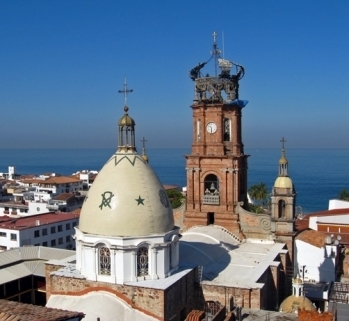
I was born in New York, and I expected early in my life to become a famous, accomplished person with an illustrious career that took me to exotic, important places. It wasn’t until my 30s, after much failure and disappointment both with myself and with my own country, that I found my way to Mexico and a new path. I could not possibly overstate my love and gratitude to this country for that. It’s true that as a foreigner, I’m blissfully unaware of many drawbacks that Mexico imposes on its own people. But be that as it may, as my time here grows longer, I feel that Mexico is making me a better person - more tolerant, more patient, more creative, and healthier both physically and mentally.
In my early years here, I spent winters living cheaply and primitively in Yelapa. This is a town near Puerto Vallarta without cars and until recently without electricity - a place where everything has to be made up as you go along, including yourself. Tossing aside my North American reserve, I began performing music and comedy in a restaurant. I also began drawing, including an illustrated map of Yelapa. I have been making maps of the Bay of Banderas region ever since, inventing my technique from scratch as I go along. In the process, I have driven and walked much of the region’s backstreets, and developed a sense of belonging to this land - the beauty and the potholes both.
What lures me onward is the sense that things are not finished here. The future is up for grabs. What is built now can be a ruin ten years from now (the tropical climate always has the last laugh). What appears ruined now will likely be taken up by some scrappy, hope-filled entrepreneur and turned into something useful later on. The conditions of climate, politics, and economy all require people to be flexible and creative - and they are, amazingly so. I am in awe of average Mexican citizens’ instinct and ability to fend for themselves, to stay grounded close to home in community and family, to know how to fix things, to improvise almost any type of household amenity, and to manage to have laughs and friends be a part of everyday life no matter how little money there is. I view these qualities as profound strengths.
I am an artist at heart, and my spirits can only soar when I am being creative. The ironic dilemma in hyper-modern societies like the U.S. and Canada is that, in spite of capitalism’s insistence that “growth” and ever-increasing productivity are required to keep the society happy, there is very little room for true creativity and freedom. People are living in an environment where everything long ago was rendered automatic, programmed, regulated, and, in a real sense, finished. As an American I was instructed from birth that freedom is the most important value. Yet I had to struggle a lot in Mexico to be tolerant of other people’s freedom - to make noise all night, for example, if they felt like it. In Mexico, situations are normally dealt with in person, not by rule and regulation. And I think it’s that intimacy, that very real autonomy of action and community, that is most frightening to those who are comfortable in North America’s polished but strangely empty spaces.
Puerto Vallarta is rather isolated, even from the rest of Mexico - yet living here, I feel very much that I am living in that bigger planet Earth I always wanted to take part in as a young man. The one where borders mean less and less, traditional ways of life scrape awkwardly against modern technology, and the presence of international visitors and international cable channels means your average cab driver has a pretty accurate take on the larger world picture.
Much of what’s happening in Mexico is quite similar to the struggles of developing countries all over the world to carve democracy and justice out of the fast-paced technological boom unfolding all around us. And so what happens here is of of consequence to anyone interested in knowing where humanity is headed in the 21st century. Will we endure, be patient, muster our creativity, and show solidarity? Or will we fight selfishly over the scraps while the ruling elites laugh?
The American people as a whole are mostly caught up in the latter option at the moment. Mexicans’ common sense, by contrast, just might pull them through. The key is going to be education - an area that needs much improvement and investment, but where the trends are clearly moving in the right direction.
Written by Jeffrey Obser for Caras de México. Click here to read more articles examining Mexican identity.